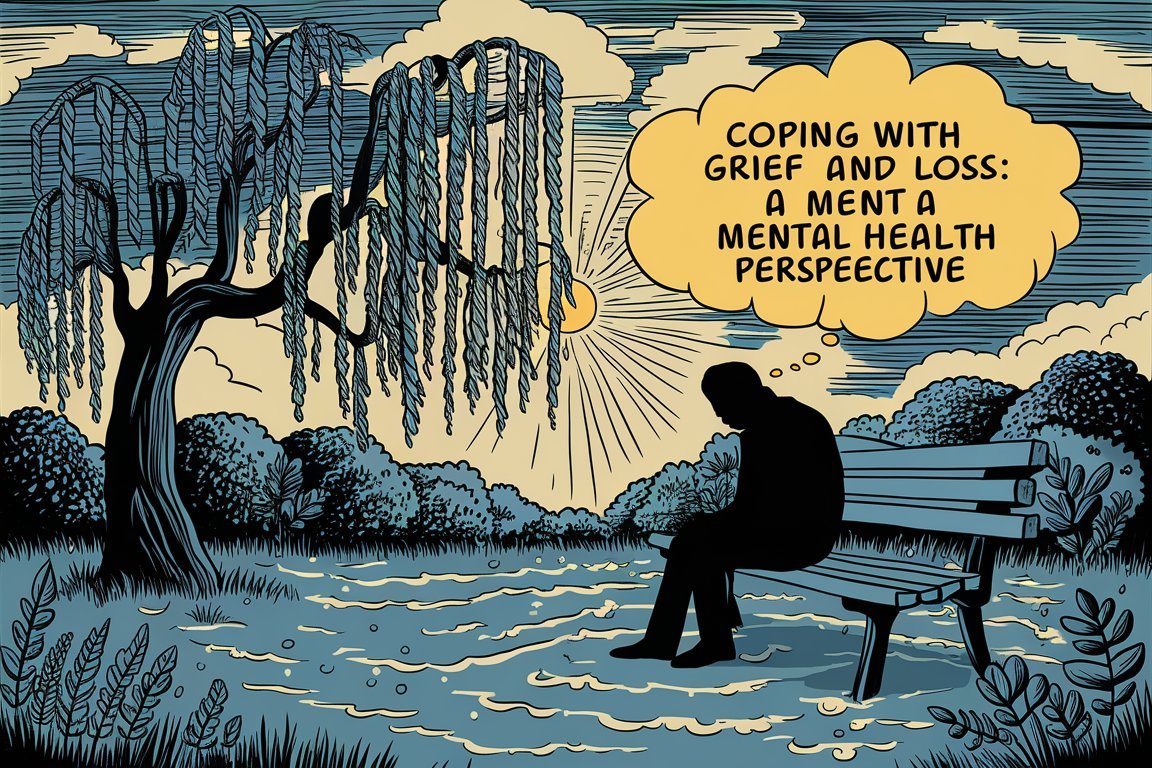Coping with Grief and Loss: A Mental Health Perspective
Hey there, young hearts. Today, we’re going to talk about something that can be really tough and scary – grief and loss. I know, it’s not the most fun topic in the world, but it’s something that affects all of us at some point in our lives, and it’s important to know how to cope when it happens.
First of all, let me just say this: if you’re going through a loss right now, whether it’s the death of a loved one, the end of a friendship, or even the loss of a pet, I want you to know that it’s okay to feel whatever you’re feeling. Grief is a normal, natural response to loss, and there’s no right or wrong way to do it.
What is Grief?
Grief is the emotional pain and sadness we feel when we lose someone or something important to us. It can be a really intense, overwhelming feeling that affects us in all sorts of ways – physically, emotionally, and mentally.
Some common signs of grief include:
- Feeling sad, angry, or numb
- Having trouble sleeping or eating
- Feeling like you’re in a fog or disconnected from the world around you
- Having difficulty concentrating or making decisions
- Feeling like you’ll never be happy again
These feelings are all normal and natural, and they can last for a few days, a few weeks, or even longer. Everyone grieves differently, and there’s no set timeline for how long it should take.
The Stages of Grief
You might have heard of the “stages of grief” – denial, anger, bargaining, depression, and acceptance. These stages were first described by a woman named Elisabeth Kübler-Ross, who studied how people cope with loss and death.
While these stages can be a helpful way to understand the grieving process, it’s important to remember that they’re not a one-size-fits-all solution. Not everyone goes through all the stages, and they don’t always happen in a neat, linear order.

Here’s a quick breakdown of what each stage might look like:
Denial: This is when you first learn about the loss, and your brain kind of goes into shock. You might feel numb or disconnected, like it’s not really happening.
Anger: As the reality of the loss starts to sink in, you might feel angry or frustrated. You might be mad at the person who died, at the world, or even at yourself.
Bargaining: This is when you start to think about all the “what ifs” and “if onlys.” You might find yourself making deals with a higher power, like “If you bring them back, I promise I’ll be a better person.”
Depression: This is when the sadness really hits you. You might feel hopeless, helpless, and like life will never be the same again.
Acceptance: This is when you start to come to terms with the loss and find a way to move forward. It doesn’t mean you’re “over it” or that you don’t still feel sad sometimes, but it means you’ve found a way to live with the loss and keep going.
Again, these stages are just a guideline – everyone’s grief journey is different, and that’s okay.
Coping with Grief
So, how do you cope with grief when it feels like the world is ending? Here are a few tips and strategies that might help:
Feel Your Feelings
One of the most important things you can do when you’re grieving is to let yourself feel your feelings. Don’t try to push them away or pretend they’re not there – that will only make them bigger and scarier in the long run.
Instead, try to name your feelings and give them some space. You might say something like, “I’m feeling really sad and angry right now, and that’s okay.” You can even try writing your feelings down in a journal or drawing a picture of them.
Talk to Someone
Grief can be really lonely, but you don’t have to go through it alone. Talking to someone you trust – like a parent, a friend, a teacher, or a counselor – can help you feel less alone and more supported.
You might say something like, “I’m really struggling with my grief right now, and I could use someone to talk to. Can we chat for a bit?” Or, if you’re not ready to talk out loud, you could write a letter or send a text message.
Take Care of Yourself
When you’re grieving, it can be easy to let your physical and emotional needs fall by the wayside. But taking care of yourself is super important for helping you cope and heal.
Try to eat regular meals, even if you don’t feel hungry. Get some exercise, even if it’s just a short walk around the block. And make sure you’re getting enough sleep, even if it means taking a nap during the day.
You might also find comfort in doing things that make you feel good, like taking a warm bath, cuddling with a pet, or watching your favorite movie.
Remember the Good Times
When you’re in the thick of grief, it can be hard to remember anything but the pain and sadness. But try to take some time to think about the happy memories you have with the person or thing you lost.
You might look at old photos, tell stories with friends and family, or even make a memory box filled with special objects and mementos. Remembering the good times can help you feel more connected to your loved one and find some joy and comfort in the midst of your grief.
Be Patient with Yourself
Grief is a process, and it takes time. Don’t put pressure on yourself to “get over it” or “move on” before you’re ready. It’s okay to have good days and bad days, and it’s okay to take things one moment at a time.
Try to be kind and patient with yourself, and remember that healing happens gradually, not all at once.
Seek Professional Help
If your grief feels too big to handle on your own, or if it’s been a while and you’re still struggling to cope, it might be time to seek professional help.
A therapist or counselor who specializes in grief can help you process your feelings, learn coping skills, and find ways to move forward. They can also help you deal with any other mental health issues that might come up, like depression or anxiety.
There’s no shame in asking for help – in fact, it’s a sign of strength and self-awareness. And remember, you don’t have to go through this alone.
Finding Meaning and Purpose
One of the hardest things about grief is the feeling that life has lost its meaning and purpose. When someone or something we love is gone, it can feel like there’s no point in going on.
But even in the darkest of times, there are still ways to find meaning and purpose in life. Here are a few ideas:
Honor Your Loved One’s Memory
Think about ways you can keep your loved one’s memory alive and honor the impact they had on your life. You might volunteer for a cause they cared about, start a scholarship in their name, or even just share stories and memories with others who loved them too.
Find Ways to Give Back
Helping others can be a powerful way to find meaning and purpose in the midst of grief. You might volunteer at a local animal shelter, donate to a charity that’s important to you, or even just do something kind for a friend or neighbor.
Pursue Your Passions
What makes you feel alive and excited? What brings you joy and fulfillment? Pursuing your passions and interests can help you find a sense of purpose and meaning, even when life feels hard.
Maybe you love to paint, or sing, or play sports. Maybe you’re passionate about science, or writing, or helping others. Whatever it is, make time for the things that light you up inside.
Embrace Your Spirituality
For some people, grief can be a time of spiritual exploration and growth. You might find comfort in prayer, meditation, or other spiritual practices. You might seek out a faith community or explore different belief systems to find what resonates with you.
Remember, there’s no one “right” way to find meaning and purpose – it’s a personal journey, and what works for one person might not work for another. The important thing is to keep searching, keep exploring, and keep holding onto hope.
Moving Forward
Grief is a journey, and it’s one that doesn’t really have an end point. Even years after a loss, you might still have moments of sadness or longing. That’s normal, and it doesn’t mean you’re not healing or moving forward.
But over time, the pain of grief does start to soften. You start to have more good days than bad days. You start to find joy and laughter again. And you start to see that even though life will never be the same, it can still be beautiful and meaningful.
Here are a few final thoughts to keep in mind as you navigate your own grief journey:
- Be gentle with yourself. Grief is hard, and it’s okay to have ups and downs.
- Reach out for help when you need it. You don’t have to go through this alone.
- Find ways to honor.













Leave a Reply